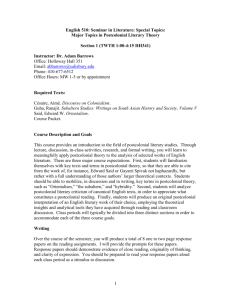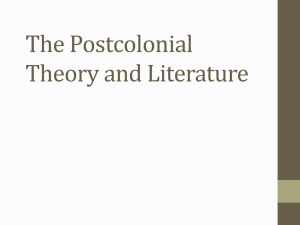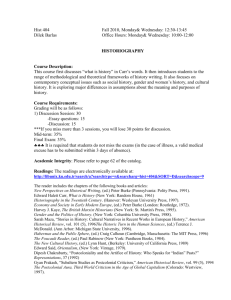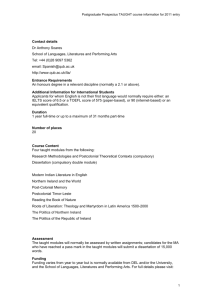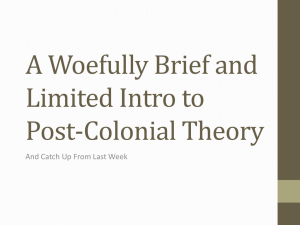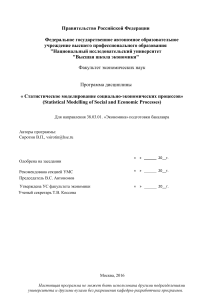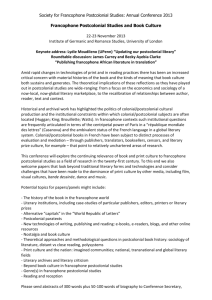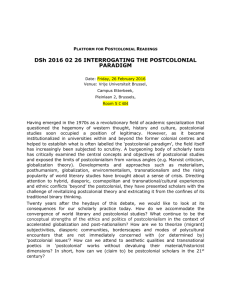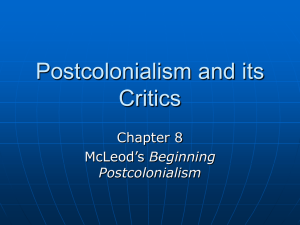肇芟肊 - Высшая школа экономики
advertisement
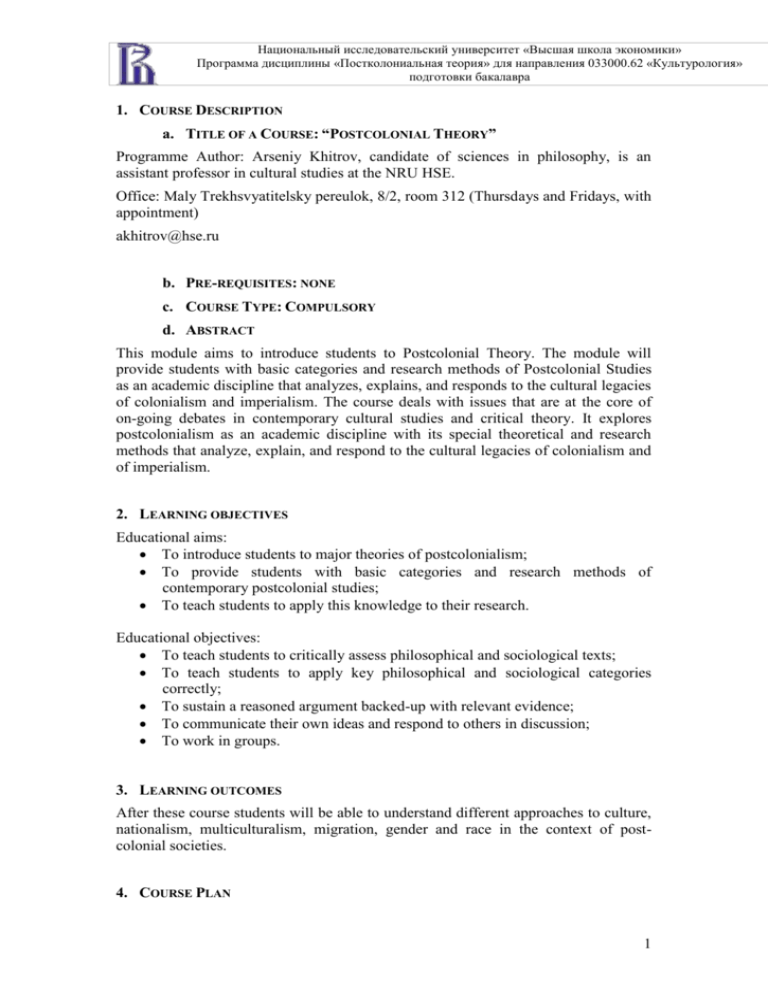
Национальный исследовательский университет «Высшая школа экономики» Программа дисциплины «Постколониальная теория» для направления 033000.62 «Культурология» подготовки бакалавра 1. COURSE DESCRIPTION a. TITLE OF A COURSE: “POSTCOLONIAL THEORY” Programme Author: Arseniy Khitrov, candidate of sciences in philosophy, is an assistant professor in cultural studies at the NRU HSE. Office: Maly Trekhsvyatitelsky pereulok, 8/2, room 312 (Thursdays and Fridays, with appointment) akhitrov@hse.ru b. PRE-REQUISITES: NONE c. COURSE TYPE: COMPULSORY d. ABSTRACT This module aims to introduce students to Postcolonial Theory. The module will provide students with basic categories and research methods of Postcolonial Studies as an academic discipline that analyzes, explains, and responds to the cultural legacies of colonialism and imperialism. The course deals with issues that are at the core of on-going debates in contemporary cultural studies and critical theory. It explores postcolonialism as an academic discipline with its special theoretical and research methods that analyze, explain, and respond to the cultural legacies of colonialism and of imperialism. 2. LEARNING OBJECTIVES Educational aims: To introduce students to major theories of postcolonialism; To provide students with basic categories and research methods of contemporary postcolonial studies; To teach students to apply this knowledge to their research. Educational objectives: To teach students to critically assess philosophical and sociological texts; To teach students to apply key philosophical and sociological categories correctly; To sustain a reasoned argument backed-up with relevant evidence; To communicate their own ideas and respond to others in discussion; To work in groups. 3. LEARNING OUTCOMES After these course students will be able to understand different approaches to culture, nationalism, multiculturalism, migration, gender and race in the context of postcolonial societies. 4. COURSE PLAN 1 Национальный исследовательский университет «Высшая школа экономики» Программа дисциплины «Постколониальная теория» для направления 033000.62 «Культурология» подготовки бакалавра N 1. 2. 3. 4. 5. 6. 7. Topic Total Contact hours Lectures Seminars 2 2 Students' independ ent work 9 3 2 9 5 4 10 5 3 3 3 10 10 3 2 9 3 2 9 24 18 66 Colonialism / postcolonialism: the basic concepts and themes of postcolonial theory (Introduction) Pathology of colonialism: Frantz Fanon Orientalism: Knowledge and Power (Edward Said) Imperialism / Nationalism Subaltern Studies: Gayatri Spivak, Walter D. Mignolo Hybridity, mimicry, ambivalence: Homi Bhabha The borders and the future of postcolonial theory 108 Lectures 1. Colonialism, post(-)colonialism, neocolonialism. Postcolonial theory & postcolonial studies. Foundations of postcolonial theory. Critical theory or ideology critique. Marx, Nietzsche, and Freud on people’s hidden motives. 2. Capitalism and imperialism. Motyl on the empire. 3. The history of the trans-Atlantic slave trade. Racism. 4. The trans-Atlantic slave trade and literature. Nationalism. 5. Formation of Afro-American identities. 6. Animals and colonialism. Seminars 1. Orientalism: Knowledge and Power Said, Edward W. Orientalism. New York: Vintage Books, A Division of Random House, 1979, P. 1-28. 2 Национальный исследовательский университет «Высшая школа экономики» Программа дисциплины «Постколониальная теория» для направления 033000.62 «Культурология» подготовки бакалавра 2. Orientalism: Knowledge and Power Said, Edward W. Orientalism. New York: Vintage Books, A Division of Random House, 1979, P. 201-225. 3. Orientalism: Knowledge and Power Said, Edward. Culture and Imperialism. New York: Random House, 1993, P. 80-96, 111-132. 4. Orientalism: Knowledge and Power Said, Edward W. “Orientalism Reconsidered.” Cultural Critique 1 (1985): 89–107. Print. Said, Edward W. Orientalism. London: Pinguin, 2003. P. xi-xxiv. Said, Edward W. “Orientalism Once More.” Development and Change 35.5 (2004): 869–879. Print. Эткинд А. Дыра в картине мира: почему колониальные авторы писали о России, а постколониальные нет // Ab Imperio, 1, 2011. С. 99-116. 5. Subaltern Studies Moore-Gilbert, B. J. Postcolonial Theory: Contexts, Practices, Politics. London; New York: Verso, 1997. P. 74-113 (Chapter 3 "Gayatri Spivak: the deconstructive twist"). 6. Derrida on national communities Leonard, Philip. Between Poststructuralism and Postcolonial Theory: Rethinking National Identity. Basingstoke: Palgrave Macmillan, 2004. P. 20-50 (Chapter 2. ‘Before, Across, and Beyond’: Derrida, Without National Community). 7. Franz Fanon and hybridity Fanon, Frantz. Black Skin, White Masks. London: Pluto Press, 2008. P. 109-140. 8. Hybridity, mimicry, ambivalence: Homi Bhabha Bhabha, Homi K. The Location of Culture. London; New York: Routledge, 1994. Print. P. 66-83. 9. Russian postcolonialism Gerasimov, Ilya, Sergey Glebov, and Marina Mogilner. “The Postimperial Meets the Postcolonial: Russian Historical Experience and the Postcolonial Moment.” Ab Imperio 2013.2 (2013): 97–135. 5. READING LIST a. REQUIRED Aijaz, Ahmad. In Theory: Classes, Nations, Literatures. London; New York: Verso, 1994. Print. Anderson, Benedict. Imagined communities. London, New York: Verso, 1991. Print. Ashcroft, Bill, Gareth Griffiths, and Helen Tiffin. The Empire Writes Back Theory and Practice in Post-colonial Literatures. London; New York: Routledge, 2002. Print. 3 Национальный исследовательский университет «Высшая школа экономики» Программа дисциплины «Постколониальная теория» для направления 033000.62 «Культурология» подготовки бакалавра Ashcroft, Bill. Post-colonial Transformation. London; New York: Routledge, 2001. Print. Bhabha, Homi K. Nation and Narration. London, New York: Routledge, 1990. Print. Bhabha, Homi K. The Location of Culture. London; New York: Routledge, 1994. Print. Boehmer, Elleke. Colonial and Postcolonial Literature: Migrant Metaphors. Oxford; New York: Oxford University Press, 2005. Print. Cammack, Richard, Michel Frey, and Robert Robson. Hydrogen as a Fuel: Learning from Nature. CRC Press, 2002. Print. Childs, Peter, and Patrick Williams. An Introduction to Post-Colonial Theory. London: Prentice Hall, 1997. Print Eagleton, Terry et al. Nationalism, Colonialism, and Literature. Minneapolis: University of Minnesota Press, 1990. Print. Empire speaks out: languages of rationalization and self-description in the Russian Empire. Leiden ; Boston: Brill, 2009. Print. Fanon, Frantz. Black Skin, White Masks. London: Pluto Press, 2008. Print. Fanon, Frantz. The Wretched of the Earth. New York: Grove Press, 2005. Print. Gandhi, Leela. Postcolonial Theory: A Critical Introduction. New York: Columbia UP, 1998. Print. Gerasimov, Ilia. Modernism and public reform in late imperial Russia: rural professionals and self-organization, 1905-30. Houndmills, Basingstoke, Hampshire ; New York: Palgrave Macmillan, 2009. Print. Gerasimov, Ilya, Sergey Glebov, and Marina Mogilner. “The Postimperial Meets the Postcolonial: Russian Historical Experience and the Postcolonial Moment.” Ab Imperio 2013.2 (2013): 97–135. Print. Gilroy, Paul. The Black Atlantic: Modernity and Double Consciousness. Harvard University Press, 1993. Print. Hall, Stuart. “When was «The Post-Colonial»?: Thinking at the Limit”. The Postcolonial Question: Common Skies, Divided Horizons. Ed. L. Curti and I Chambers. London: Routledge, 1996. 242-60. Print. Leonard, Philip. Between Poststructuralism and Postcolonial Theory: Rethinking National Identity. Basingstoke: Palgrave Macmillan, 2004. Print. Mbembé, Achille J. On the Postcolony. Berkeley: University of California Press, 2001. Print. Mignolo, Walter. (Post)Occidentalism, (Post)Coloniality, and (Post)Subaltern Rationality. The Pre-Occupation of Postcolonial Studies. Ed. Fawzia Afzal-Khan and Kalpana Seshadri-Crooks. Durham: Duke UP, 2000. Print. Moore-Gilbert, B. J. Postcolonial Theory: Contexts, Practices, Politics. London; New York: Verso, 1997. Print. Parry, Benita. Postcolonial Studies: a Materialist Critique. London; New York: Routledge, 2004. Print. Pratt, Mary Louise. Imperial Eyes. Travel Writing and Transculturation. London; New York: Routledge, 1992. Print. Said, Edward W. “Orientalism Once More.” Development and Change 35.5 (2004): 869–879. Print. Said, Edward W. “Orientalism Reconsidered.” Cultural Critique 1 (1985): 89–107. Print. Said, Edward W. Culture and Imperialism. New York: Vintage books, 1994. Print. 4 Национальный исследовательский университет «Высшая школа экономики» Программа дисциплины «Постколониальная теория» для направления 033000.62 «Культурология» подготовки бакалавра Said, Edward W. Orientalism. New York: Vintage Books, A Division of Random House, 1979. Print. Said, Edward. Culture and Imperialism. New York: Random House, 1993. Print. Spivak, Gayatri Ch. “Can Subaltern speak?” Marxism and the Interpretation of Culture. Ed. Cary Nelson and Lawrence Grossberg. University of Illinois Press. 1 Oct. 1988. p. 271-313. Print. Spivak, Gayatri Ch. A Critique of Postcolonial Reason: Toward a History of the Vanishing Present. Cambridge, Mass.: Harvard University Press, 1999. Print. Tiffin, Helen. Five Emus to the King of Siam Environment and Empire. Amsterdam; New York: Rodopi, 2007. Print. Young, Robert J. C. Colonial Desire. Hoboken: Routledge, 1994. Print. Young, Robert J. C. Postcolonialism: A Historical Introduction. Oxford and Malden, Mass.: Blackwell Publishers, 2001. Print. Young, Robert J. C. White Mythologies Writing History and the West. London; New York: Routledge, 2004. Print. Young, Robert J. C. Post-colonialism: An Introduction. Oxford: Blackwell Publishers, 1999. Print. Герасимов И. В. Нулевые. Степень. Письма. Новое издательство, Москва, 2009. Глебов С. В. Евразийство между империей и модерном: история в документах Новое издательство, Москва, 2010. Изобретение империи: языки и практики. Новое издательство, Москва, 2011. Империя и нация в зеркале исторической памяти. Новое издательство, Москва, 2011. Конфессия, империя, нация: религия и проблема разнообразия в истории постсоветского пространства. Новое издательство, Москва, 2012. Мифы и заблуждения в изучении империи и национализма. Новое издательство, Москва, 2010. Новая имперская история постсоветского пространства: Сборник статей. Казань, 2004. Регион в истории империи: исторические эссе о Сибири. Новое издательство, Москва, 2013. Там, внутри. Практики внутренней колонизации в культурной истории России: Сб. статей /Под ред. А. Эткинда, Д. Уффельманна, И. Кукулина. М.: Новое литературное обозрение, 2012. Тлостанова, М. “Жить Никогда, Писать Ниоткуда.” Постсоветская литература и эстетика транскультрации. М., УРСС. 2004. Эткинд, А. Внутренняя колонизация. Имперский опыт России. М.: Новое литературное обозрение, 2013. b. OPTIONAL Anker, Peder. Imperial Ecology Environmental Order in the British Empire, 18951945. Cambridge, Mass.: Harvard University Press, 2001. Print. Bhabha, Homi. Nation and Narration. London & New York: Routledge, 2003. Print. Buruma, Ian and Avishai Margalit. Occidentalism: A Short History of AntiWesternism. London: Atlantic Books, 2004. Print. Butler, Judith and Gayatri Chakravorty Spivak. Who Sings the Nation-State? London– New York–Calcutta: Seagull Books, 2007. Print. Cixous, Hélène. Stigmata escaping texts. London; New York: Routledge, 2005. Print. Dabashi, Hamid. The Arab Spring: The End of Postcolonialism, New York: Zed 5 Национальный исследовательский университет «Высшая школа экономики» Программа дисциплины «Постколониальная теория» для направления 033000.62 «Культурология» подготовки бакалавра Books, 2012. Print. Lenin, Vladimir. Imperialism, the Highest Stage of Capitalism. Peking: Foreign Languages Press, 1970. Print. Miller, Joseph Calder. Way of Death. Merchant Capitalism and the Angolan Slave Trade, 1730-1830. Madison, Wis.: University of Wisconsin Press, 1988. Print. Szeman, Imre. Zones of Instability: Literature, Postcolonialism, and the Nation. Baltimore: Johns Hopkins University Press, 2003. Print. There is an on-line version of the course on LMS. All literature is available via LMS. 6 Национальный исследовательский университет «Высшая школа экономики» Программа дисциплины «Постколониальная теория» для направления 033000.62 «Культурология» подготовки бакалавра 6. Grading System Cumulative Grade 1 2 Control over the course of the semester Seminar Grade Gcurrent Gseminar A comment on the text. 500-600 words, posted on LMS before the beginning of the exam week. 10 grades max. Gcurrent = Gtest Active performance during the seminar - 1 maximum per seminar; Episodic but quality performance during the seminar - 0,5; Sub-standard (may be active) performance - 0. Exam Grade Independent Work Grade No assessments Final Grade (Goes into the Diploma) Gexam A comment on the seminar. 500-600 words, posted on LMS before the beginning of the exam week. 10 grades max. 1 q1 = 0,4 q2 = 0,6 2 Оfinal = q1*Gexam + q2*Gcummulative k1=0,5 k2=0,5 Gcummulative= k1*Gcurrent + k2*Gseminar At the end: Gcummulative* Gexam Gfinal* * These grades are subject to rounding. 7 7. GUIDELINES FOR KNOWLEDGE ASSESSMENT Comments on texts and comments on seminars should: be posted on LMS in time; be well-structured, logical, and clearly written (50% of the grade will be of the structure and logic of the answer); be started with a clear question and be finished with a clear answer of this question; demonstrate a student’s ability to analyse critically issues that we dealt with during our seminars and lectures; rely on concepts and theories that we have studied throughout the course; be a student’s own critical and well-argued judgments, not a detailed exposition of theories. 8. METHODS OF INSTRUCTION I divide the audience into 2-3 groups and give each group 20-25 minutes to prepare 1 critical statement about the texts recommended for the seminar and 3-4 critical questions for the other groups. Questions must start with words ‘how’, ‘why’ and never with ‘who’, ‘what’, or ‘when’, so that the answer would not be an exposition of texts but students’ own reasoning. The rest of the seminar is staged as an exchange of critical statements and questions between the groups accompanied with the teacher’s comments. During the course every student has to post 1 comment on one particular seminar and 1 comment on any comment on the other concrete seminar. This task aims at provoking students to critically assess judgments of their fellow-students. 9. SPECIAL EQUIPMENT AND SOFTWARE SUPPORT (IF REQUIRED) Not required.
